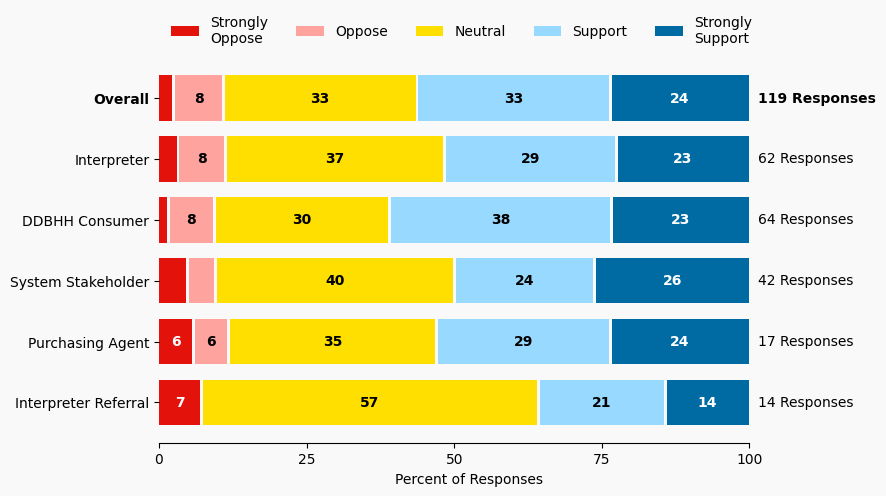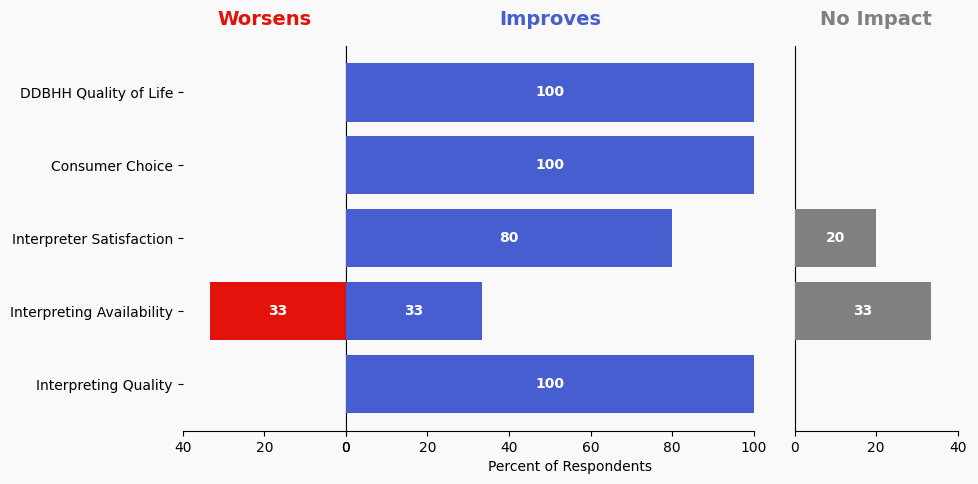33 Legislate Requiring Consumer Grievance Process for Referral Companies
Issue: DDBHH consumers often feel that concerns or complaints about interpreters are not addressed.
Proposed Solution: Commission and coalition pursue legislation to require interpreter referral companies providing services in Minnesota to have a publicly published grievance process, which includes information on appeals and escalations of the grievance if the consumer is not satisfied with the result. Before pursuing legislative action, research would need to be collected about current interpreter referral companies’ practices relating to grievances from consumers.
Expected outcome: DDBHH consumers would have clear routes for filing grievances about interpreters. Interpreters could receive critical information for improved professional practice.
Who is impacted: Consumer, interpreter
Timeline: 6 months

Summary of Support Image Description
The stacked bar charts show how respondents rated their level of support and the total number of responses. The percentage for the five support levels is shown from left to right: Strongly Oppose (Dark Red), Oppose (Light Red), Neutral (Yellow), Support (Light Blue), and Strongly Support (Dark Blue).
Respondents may identify with multiple subgroups. The overall level of support is:
Overall
Strongly Oppose: 3%
Oppose: 8%
Neutral: 33%
Support: 33%
Strongly Support: 24%
Click to see the detailed image description for each subgroup.
Interpreter
Strongly Oppose: 3%
Oppose: 8%
Neutral: 37%
Support: 28%
Strongly Support: 23%
Interpreter Referral
Strongly Oppose: 7%
Oppose: 0%
Neutral: 56%
Support: 21%
Strongly Support: 14%
DDBHH Consumer
Strongly Oppose: 2%
Oppose: 8%
Neutral: 30%
Support: 38%
Strongly Support: 23%
Purchasing Agent
Strongly Oppose: 6%
Oppose: 6%
Neutral: 35%
Support: 28%
Strongly Support: 24%
System Stakeholder
Strongly Oppose: 5%
Oppose: 5%
Neutral: 40%
Support: 24%
Strongly Support: 26%
Overview of Respondents Opting for In-Depth Solution Analysis
After indicating their support level, 1% of the 119 respondents opted in to further assess whether the solution would worsen or improve on five metrics. Of the opt-in reviewers (2 respondents), 50% supported the solution, 0% were neutral on the solution, and 50% opposed the solution.
The remaining 117 respondents did not opt in to further assess the solution. Of these people, 56% support the solution, 33% were neutral on the solution, and 10% opposed the solution.
Reviewer Evaluation of Solution Effectiveness

Solution Effectiveness Image Description
The stacked bar charts show how respondents assessed the effectiveness of this solution based on five metrics. For each metric, the percentage of respondents is shown from left to right: Worsens (Red), Improves (Blue), No Impact (Gray).
DDBHH Quality of Life
Makes It Worse 0%
Makes It Better 100%
No Impact 0%
Interpreter Satisfaction
Makes It Worse 0%
Makes It Better 80%
No Impact 20%
Consumer Choice
Makes It Worse 0%
Makes It Better 100%
No Impact 0%
Interpreting Availability
Makes It Worse 33%
Makes It Better 33%
No Impact 33%
Interpreting Quality
Makes It Worse 0%
Makes It Better 100%
No Impact 0%
Reviewer Feedback and Insights
Interpreter
Comments from Interpreters suggest that legislating a consumer grievance process for referral companies could help improve accountability within the industry. Concerns include ensuring that the process is fair and accessible to all parties involved. Suggestions include creating a clear process for addressing complaints and ensuring that the process is transparent.
Deaf, DeafBlind, Hard of Hearing
Comments from DDBHH Consumers express support for legislating a grievance process for referral companies, with concerns about ensuring that the process is accessible to consumers. Suggestions include creating a system that allows consumers to file complaints easily and receive timely responses. Concerns focus on ensuring that the process promotes accountability without creating unnecessary barriers for consumers.
System Stakeholder
Comments from System stakeholders suggest that legislating a grievance process could help improve transparency and accountability within the interpreting profession. Suggestions include creating a standardized grievance process that ensures fairness for all parties involved. Concerns include ensuring that the process is transparent and accessible to both interpreters and consumers.
PREVIOUS SOLUTION
32 Provide Co-Navigating and Other Workshops to Interpreters
Issue: DeafBlind individuals express concerns about specific skill sets that very few interpreters are able to demonstrate.
NEXT SOLUTION
Issue: There are few successful BIPOC or DDBHH-owned (aka Disabled-owned) interpreter referral companies. While there is not any support for a start-up or ongoing interpreting referral company owner, BIPOC and DDBHH persons often experience greater inequities.
Leave a Reply